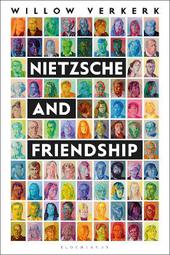
|
Nietzsche and Friendship
Hardback
Main Details
Description
In Nietzsche and Friendship, Willow Verkerk provides a new and provocative account of Nietzsche's philosophy which identifies him as an agonistic thinker concerned with the topics of love and friendship. She argues that Nietzsche's challenges to the received principles of friendship from Aristotle to Kant offer resources for reinvigorating our thinking about friendship today. Through an examination of his free spirit texts, Human, All Too Human, Daybreak and The Gay Science together with Thus Spoke Zarathustra and Beyond Good and Evil, Verkerk unlocks key aspects of Nietzsche's thinking on friendship, love, 'woman', the self, self-overcoming, virtue, and character. She questions Nietzsche's misogyny, but also considers the emancipatory potential of his writing by brining him into dialogue with postmodern, feminist, and transgender thinkers. This book revives interest in the ethical, therapeutic, and political dimensions of Nietzsche's philosophy.
Author Biography
Willow Verkerk is a Lecturer in Continental Philosophy and Social Philosophy at the University of British Columbia, Canada and a researcher with the Gendered Mimesis Project at KU Leuven, Belgium.
ReviewsNietzsche valued friendship, and this pioneering study shows how Nietzsche's own discussion of friendship is absolutely crucial for understanding his philosophy. Through a very careful and perceptive reading of Nietzsche's texts, Verkerk argues that Nietzsche's ideas about friendship are empowering - and in this way she makes a strong case for the relevance of Nietzsche's thought in contemporary debates concerning friendship, gender relations, and love. * Richard White, Professor of Philosophy, Creighton University, USA * "We were friends and have become estranged. (...) We are two ships each of which has its goal and course. (...) Perhaps we shall meet again but fail to recognize each other: our exposure to different seas and suns has changed us!", says Nietzsche in The Gay Science. Attentive to all possible meanings of such a change, Verkerk explores with remarkable scrutiny the singular destiny of friendship, which reveals its metamorphic power only after it has died - posthumous birth of new identities. -- Catherine Malabou, Professor of Philosophy, Kingston University, UK
|